Comprehensive Analysis: Procurement and Contract Management Strategies
VerifiedAdded on 2023/01/11
|23
|8780
|77
Report
AI Summary
This report delves into the critical aspects of procurement and contract management, emphasizing its role in driving business decisions and expansion. It explores various contract types, procurement principles, and the organization of the procurement process. The report examines the principles of procurement, including the importance of right products, prices, transparency, effectiveness, fairness, and accountability. It also discusses the organization of the procurement process, highlighting the roles of specifiers, procurement managers, purchasing agents, and budget holders. Furthermore, the report covers relevant legislation, such as the EU procurement process, the Official Journal of the European Union (OJEU), the Office of Government Commerce (OGC), the Sale of Goods Act 1979, the Supply of Goods and Services Act 1982, and the Unfair Contract Terms Act 1977. The report analyzes different types of contracts, including written contracts, and their advantages and disadvantages. The report also addresses topics such as the procurement of hospitality services, the process and stages of procurement, factors for choosing successful tenders, and the use of scope and specifications in contract tendering. It also discusses the elements of cost in goods and services and the factors influencing procurement decisions.
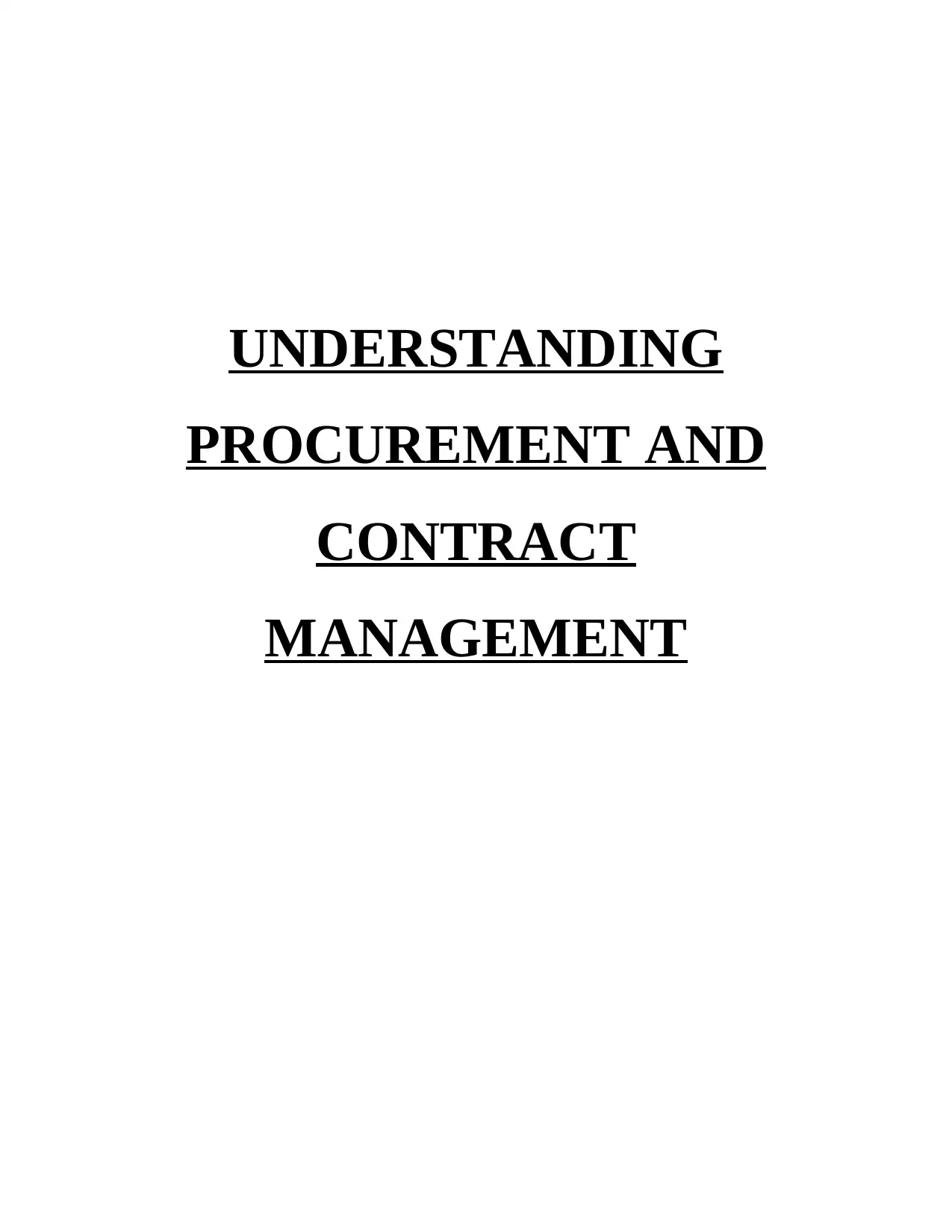
UNDERSTANDING
PROCUREMENT AND
CONTRACT
MANAGEMENT
PROCUREMENT AND
CONTRACT
MANAGEMENT
Paraphrase This Document
Need a fresh take? Get an instant paraphrase of this document with our AI Paraphraser
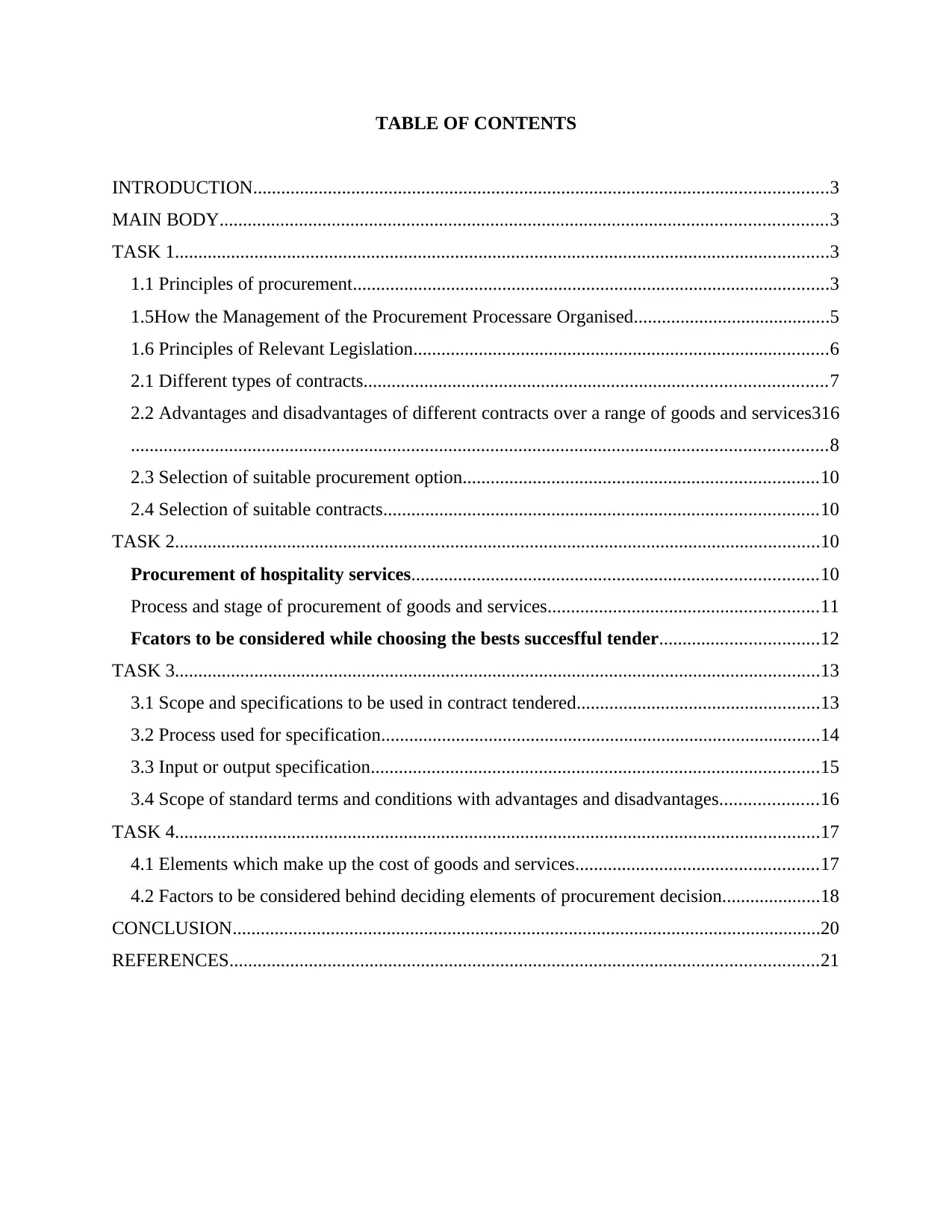
TABLE OF CONTENTS
INTRODUCTION...........................................................................................................................3
MAIN BODY..................................................................................................................................3
TASK 1............................................................................................................................................3
1.1 Principles of procurement......................................................................................................3
1.5How the Management of the Procurement Processare Organised..........................................5
1.6 Principles of Relevant Legislation.........................................................................................6
2.1 Different types of contracts...................................................................................................7
2.2 Advantages and disadvantages of different contracts over a range of goods and services316
.....................................................................................................................................................8
2.3 Selection of suitable procurement option............................................................................10
2.4 Selection of suitable contracts.............................................................................................10
TASK 2..........................................................................................................................................10
Procurement of hospitality services.......................................................................................10
Process and stage of procurement of goods and services..........................................................11
Fcators to be considered while choosing the bests succesfful tender..................................12
TASK 3..........................................................................................................................................13
3.1 Scope and specifications to be used in contract tendered....................................................13
3.2 Process used for specification..............................................................................................14
3.3 Input or output specification................................................................................................15
3.4 Scope of standard terms and conditions with advantages and disadvantages.....................16
TASK 4..........................................................................................................................................17
4.1 Elements which make up the cost of goods and services....................................................17
4.2 Factors to be considered behind deciding elements of procurement decision.....................18
CONCLUSION..............................................................................................................................20
REFERENCES..............................................................................................................................21
INTRODUCTION...........................................................................................................................3
MAIN BODY..................................................................................................................................3
TASK 1............................................................................................................................................3
1.1 Principles of procurement......................................................................................................3
1.5How the Management of the Procurement Processare Organised..........................................5
1.6 Principles of Relevant Legislation.........................................................................................6
2.1 Different types of contracts...................................................................................................7
2.2 Advantages and disadvantages of different contracts over a range of goods and services316
.....................................................................................................................................................8
2.3 Selection of suitable procurement option............................................................................10
2.4 Selection of suitable contracts.............................................................................................10
TASK 2..........................................................................................................................................10
Procurement of hospitality services.......................................................................................10
Process and stage of procurement of goods and services..........................................................11
Fcators to be considered while choosing the bests succesfful tender..................................12
TASK 3..........................................................................................................................................13
3.1 Scope and specifications to be used in contract tendered....................................................13
3.2 Process used for specification..............................................................................................14
3.3 Input or output specification................................................................................................15
3.4 Scope of standard terms and conditions with advantages and disadvantages.....................16
TASK 4..........................................................................................................................................17
4.1 Elements which make up the cost of goods and services....................................................17
4.2 Factors to be considered behind deciding elements of procurement decision.....................18
CONCLUSION..............................................................................................................................20
REFERENCES..............................................................................................................................21
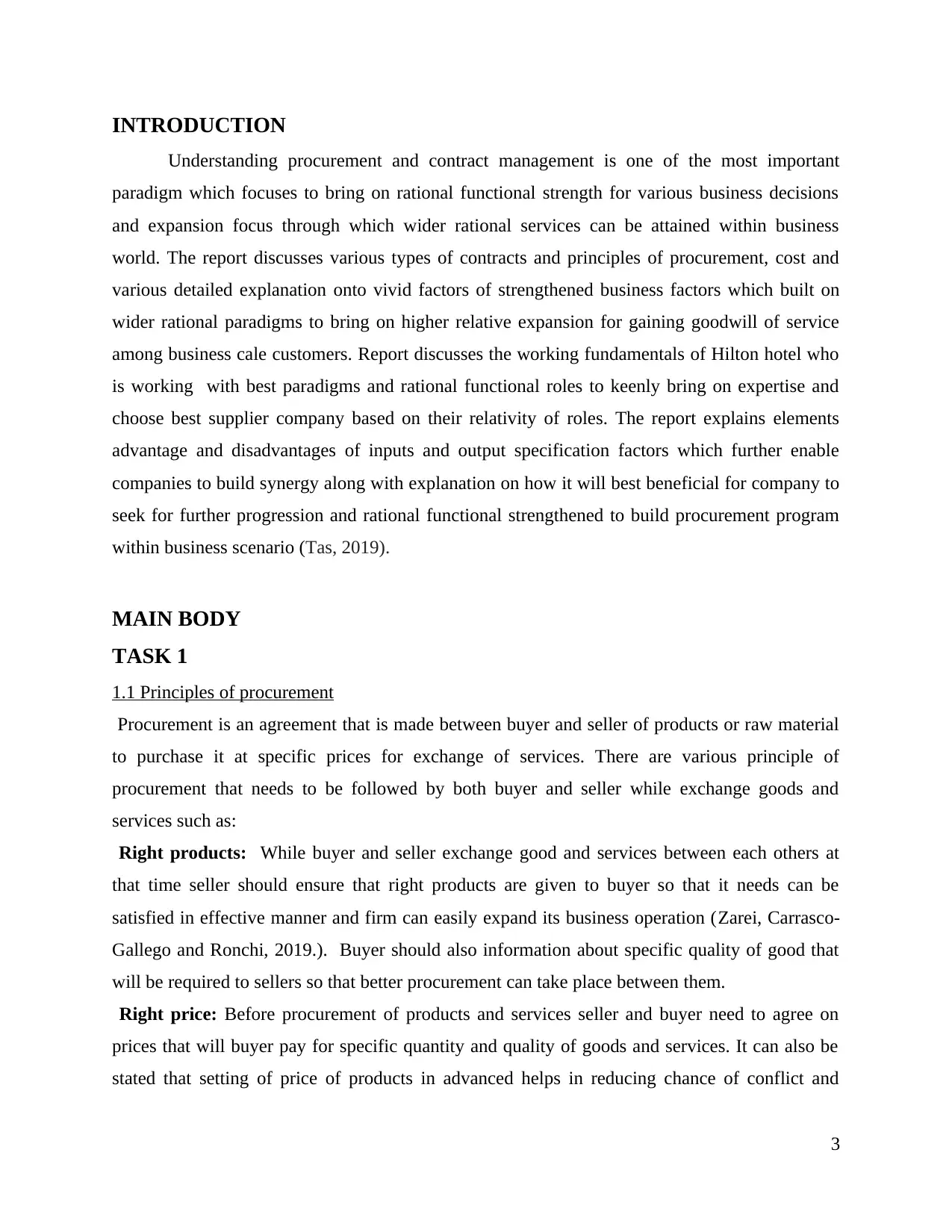
INTRODUCTION
Understanding procurement and contract management is one of the most important
paradigm which focuses to bring on rational functional strength for various business decisions
and expansion focus through which wider rational services can be attained within business
world. The report discusses various types of contracts and principles of procurement, cost and
various detailed explanation onto vivid factors of strengthened business factors which built on
wider rational paradigms to bring on higher relative expansion for gaining goodwill of service
among business cale customers. Report discusses the working fundamentals of Hilton hotel who
is working with best paradigms and rational functional roles to keenly bring on expertise and
choose best supplier company based on their relativity of roles. The report explains elements
advantage and disadvantages of inputs and output specification factors which further enable
companies to build synergy along with explanation on how it will best beneficial for company to
seek for further progression and rational functional strengthened to build procurement program
within business scenario (Tas, 2019).
MAIN BODY
TASK 1
1.1 Principles of procurement
Procurement is an agreement that is made between buyer and seller of products or raw material
to purchase it at specific prices for exchange of services. There are various principle of
procurement that needs to be followed by both buyer and seller while exchange goods and
services such as:
Right products: While buyer and seller exchange good and services between each others at
that time seller should ensure that right products are given to buyer so that it needs can be
satisfied in effective manner and firm can easily expand its business operation (Zarei, Carrasco-
Gallego and Ronchi, 2019.). Buyer should also information about specific quality of good that
will be required to sellers so that better procurement can take place between them.
Right price: Before procurement of products and services seller and buyer need to agree on
prices that will buyer pay for specific quantity and quality of goods and services. It can also be
stated that setting of price of products in advanced helps in reducing chance of conflict and
3
Understanding procurement and contract management is one of the most important
paradigm which focuses to bring on rational functional strength for various business decisions
and expansion focus through which wider rational services can be attained within business
world. The report discusses various types of contracts and principles of procurement, cost and
various detailed explanation onto vivid factors of strengthened business factors which built on
wider rational paradigms to bring on higher relative expansion for gaining goodwill of service
among business cale customers. Report discusses the working fundamentals of Hilton hotel who
is working with best paradigms and rational functional roles to keenly bring on expertise and
choose best supplier company based on their relativity of roles. The report explains elements
advantage and disadvantages of inputs and output specification factors which further enable
companies to build synergy along with explanation on how it will best beneficial for company to
seek for further progression and rational functional strengthened to build procurement program
within business scenario (Tas, 2019).
MAIN BODY
TASK 1
1.1 Principles of procurement
Procurement is an agreement that is made between buyer and seller of products or raw material
to purchase it at specific prices for exchange of services. There are various principle of
procurement that needs to be followed by both buyer and seller while exchange goods and
services such as:
Right products: While buyer and seller exchange good and services between each others at
that time seller should ensure that right products are given to buyer so that it needs can be
satisfied in effective manner and firm can easily expand its business operation (Zarei, Carrasco-
Gallego and Ronchi, 2019.). Buyer should also information about specific quality of good that
will be required to sellers so that better procurement can take place between them.
Right price: Before procurement of products and services seller and buyer need to agree on
prices that will buyer pay for specific quantity and quality of goods and services. It can also be
stated that setting of price of products in advanced helps in reducing chance of conflict and
3
⊘ This is a preview!⊘
Do you want full access?
Subscribe today to unlock all pages.

Trusted by 1+ million students worldwide
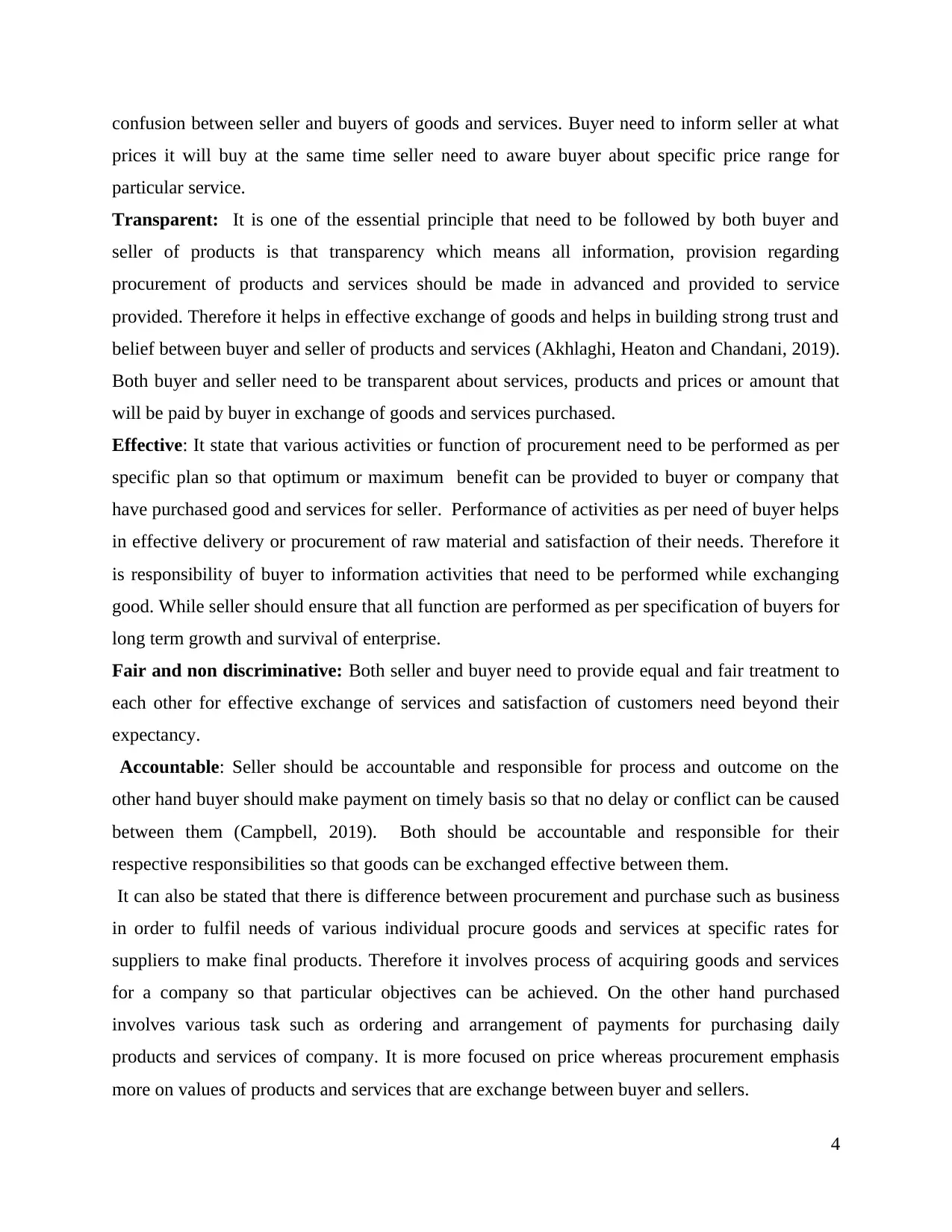
confusion between seller and buyers of goods and services. Buyer need to inform seller at what
prices it will buy at the same time seller need to aware buyer about specific price range for
particular service.
Transparent: It is one of the essential principle that need to be followed by both buyer and
seller of products is that transparency which means all information, provision regarding
procurement of products and services should be made in advanced and provided to service
provided. Therefore it helps in effective exchange of goods and helps in building strong trust and
belief between buyer and seller of products and services (Akhlaghi, Heaton and Chandani, 2019).
Both buyer and seller need to be transparent about services, products and prices or amount that
will be paid by buyer in exchange of goods and services purchased.
Effective: It state that various activities or function of procurement need to be performed as per
specific plan so that optimum or maximum benefit can be provided to buyer or company that
have purchased good and services for seller. Performance of activities as per need of buyer helps
in effective delivery or procurement of raw material and satisfaction of their needs. Therefore it
is responsibility of buyer to information activities that need to be performed while exchanging
good. While seller should ensure that all function are performed as per specification of buyers for
long term growth and survival of enterprise.
Fair and non discriminative: Both seller and buyer need to provide equal and fair treatment to
each other for effective exchange of services and satisfaction of customers need beyond their
expectancy.
Accountable: Seller should be accountable and responsible for process and outcome on the
other hand buyer should make payment on timely basis so that no delay or conflict can be caused
between them (Campbell, 2019). Both should be accountable and responsible for their
respective responsibilities so that goods can be exchanged effective between them.
It can also be stated that there is difference between procurement and purchase such as business
in order to fulfil needs of various individual procure goods and services at specific rates for
suppliers to make final products. Therefore it involves process of acquiring goods and services
for a company so that particular objectives can be achieved. On the other hand purchased
involves various task such as ordering and arrangement of payments for purchasing daily
products and services of company. It is more focused on price whereas procurement emphasis
more on values of products and services that are exchange between buyer and sellers.
4
prices it will buy at the same time seller need to aware buyer about specific price range for
particular service.
Transparent: It is one of the essential principle that need to be followed by both buyer and
seller of products is that transparency which means all information, provision regarding
procurement of products and services should be made in advanced and provided to service
provided. Therefore it helps in effective exchange of goods and helps in building strong trust and
belief between buyer and seller of products and services (Akhlaghi, Heaton and Chandani, 2019).
Both buyer and seller need to be transparent about services, products and prices or amount that
will be paid by buyer in exchange of goods and services purchased.
Effective: It state that various activities or function of procurement need to be performed as per
specific plan so that optimum or maximum benefit can be provided to buyer or company that
have purchased good and services for seller. Performance of activities as per need of buyer helps
in effective delivery or procurement of raw material and satisfaction of their needs. Therefore it
is responsibility of buyer to information activities that need to be performed while exchanging
good. While seller should ensure that all function are performed as per specification of buyers for
long term growth and survival of enterprise.
Fair and non discriminative: Both seller and buyer need to provide equal and fair treatment to
each other for effective exchange of services and satisfaction of customers need beyond their
expectancy.
Accountable: Seller should be accountable and responsible for process and outcome on the
other hand buyer should make payment on timely basis so that no delay or conflict can be caused
between them (Campbell, 2019). Both should be accountable and responsible for their
respective responsibilities so that goods can be exchanged effective between them.
It can also be stated that there is difference between procurement and purchase such as business
in order to fulfil needs of various individual procure goods and services at specific rates for
suppliers to make final products. Therefore it involves process of acquiring goods and services
for a company so that particular objectives can be achieved. On the other hand purchased
involves various task such as ordering and arrangement of payments for purchasing daily
products and services of company. It is more focused on price whereas procurement emphasis
more on values of products and services that are exchange between buyer and sellers.
4
Paraphrase This Document
Need a fresh take? Get an instant paraphrase of this document with our AI Paraphraser
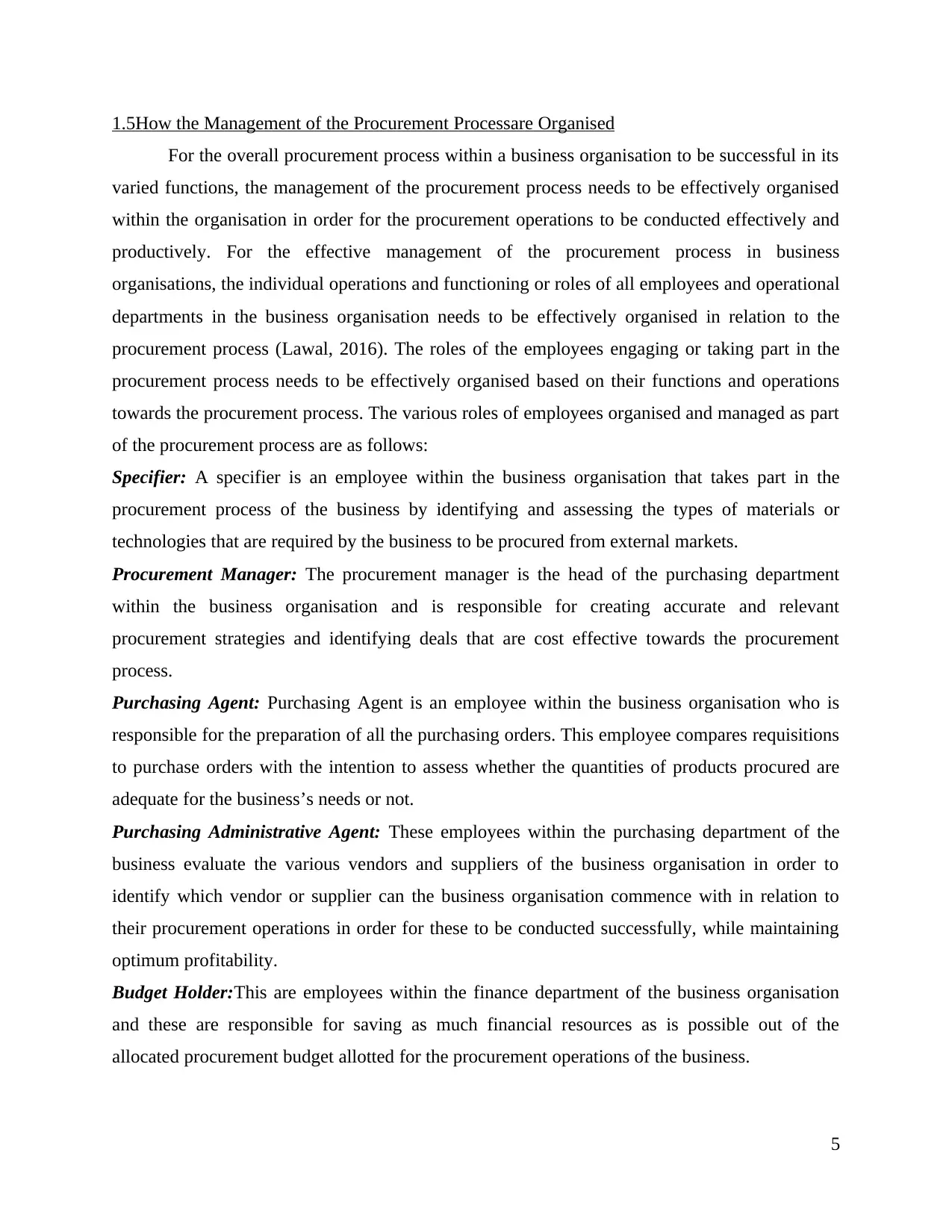
1.5How the Management of the Procurement Processare Organised
For the overall procurement process within a business organisation to be successful in its
varied functions, the management of the procurement process needs to be effectively organised
within the organisation in order for the procurement operations to be conducted effectively and
productively. For the effective management of the procurement process in business
organisations, the individual operations and functioning or roles of all employees and operational
departments in the business organisation needs to be effectively organised in relation to the
procurement process (Lawal, 2016). The roles of the employees engaging or taking part in the
procurement process needs to be effectively organised based on their functions and operations
towards the procurement process. The various roles of employees organised and managed as part
of the procurement process are as follows:
Specifier: A specifier is an employee within the business organisation that takes part in the
procurement process of the business by identifying and assessing the types of materials or
technologies that are required by the business to be procured from external markets.
Procurement Manager: The procurement manager is the head of the purchasing department
within the business organisation and is responsible for creating accurate and relevant
procurement strategies and identifying deals that are cost effective towards the procurement
process.
Purchasing Agent: Purchasing Agent is an employee within the business organisation who is
responsible for the preparation of all the purchasing orders. This employee compares requisitions
to purchase orders with the intention to assess whether the quantities of products procured are
adequate for the business’s needs or not.
Purchasing Administrative Agent: These employees within the purchasing department of the
business evaluate the various vendors and suppliers of the business organisation in order to
identify which vendor or supplier can the business organisation commence with in relation to
their procurement operations in order for these to be conducted successfully, while maintaining
optimum profitability.
Budget Holder:This are employees within the finance department of the business organisation
and these are responsible for saving as much financial resources as is possible out of the
allocated procurement budget allotted for the procurement operations of the business.
5
For the overall procurement process within a business organisation to be successful in its
varied functions, the management of the procurement process needs to be effectively organised
within the organisation in order for the procurement operations to be conducted effectively and
productively. For the effective management of the procurement process in business
organisations, the individual operations and functioning or roles of all employees and operational
departments in the business organisation needs to be effectively organised in relation to the
procurement process (Lawal, 2016). The roles of the employees engaging or taking part in the
procurement process needs to be effectively organised based on their functions and operations
towards the procurement process. The various roles of employees organised and managed as part
of the procurement process are as follows:
Specifier: A specifier is an employee within the business organisation that takes part in the
procurement process of the business by identifying and assessing the types of materials or
technologies that are required by the business to be procured from external markets.
Procurement Manager: The procurement manager is the head of the purchasing department
within the business organisation and is responsible for creating accurate and relevant
procurement strategies and identifying deals that are cost effective towards the procurement
process.
Purchasing Agent: Purchasing Agent is an employee within the business organisation who is
responsible for the preparation of all the purchasing orders. This employee compares requisitions
to purchase orders with the intention to assess whether the quantities of products procured are
adequate for the business’s needs or not.
Purchasing Administrative Agent: These employees within the purchasing department of the
business evaluate the various vendors and suppliers of the business organisation in order to
identify which vendor or supplier can the business organisation commence with in relation to
their procurement operations in order for these to be conducted successfully, while maintaining
optimum profitability.
Budget Holder:This are employees within the finance department of the business organisation
and these are responsible for saving as much financial resources as is possible out of the
allocated procurement budget allotted for the procurement operations of the business.
5
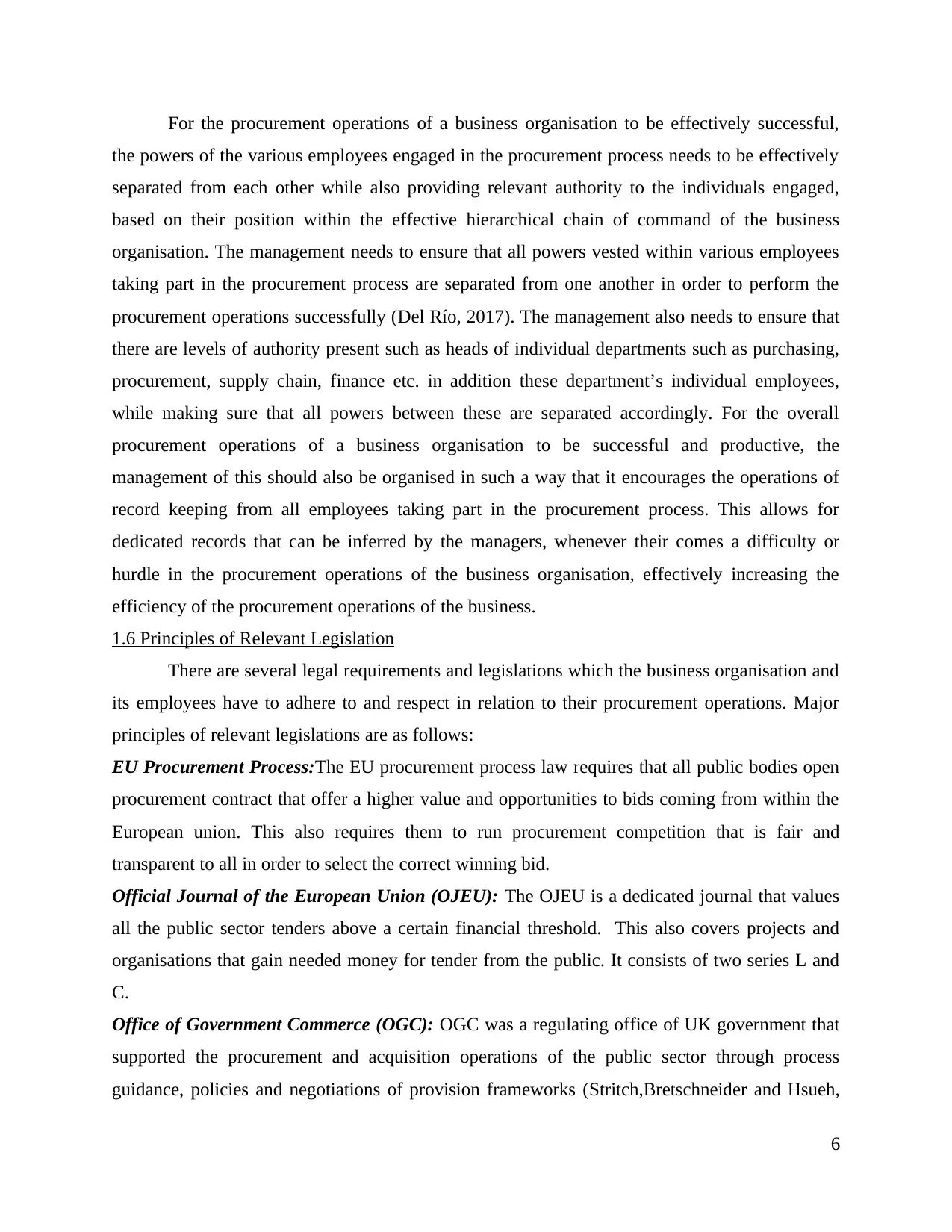
For the procurement operations of a business organisation to be effectively successful,
the powers of the various employees engaged in the procurement process needs to be effectively
separated from each other while also providing relevant authority to the individuals engaged,
based on their position within the effective hierarchical chain of command of the business
organisation. The management needs to ensure that all powers vested within various employees
taking part in the procurement process are separated from one another in order to perform the
procurement operations successfully (Del Río, 2017). The management also needs to ensure that
there are levels of authority present such as heads of individual departments such as purchasing,
procurement, supply chain, finance etc. in addition these department’s individual employees,
while making sure that all powers between these are separated accordingly. For the overall
procurement operations of a business organisation to be successful and productive, the
management of this should also be organised in such a way that it encourages the operations of
record keeping from all employees taking part in the procurement process. This allows for
dedicated records that can be inferred by the managers, whenever their comes a difficulty or
hurdle in the procurement operations of the business organisation, effectively increasing the
efficiency of the procurement operations of the business.
1.6 Principles of Relevant Legislation
There are several legal requirements and legislations which the business organisation and
its employees have to adhere to and respect in relation to their procurement operations. Major
principles of relevant legislations are as follows:
EU Procurement Process:The EU procurement process law requires that all public bodies open
procurement contract that offer a higher value and opportunities to bids coming from within the
European union. This also requires them to run procurement competition that is fair and
transparent to all in order to select the correct winning bid.
Official Journal of the European Union (OJEU): The OJEU is a dedicated journal that values
all the public sector tenders above a certain financial threshold. This also covers projects and
organisations that gain needed money for tender from the public. It consists of two series L and
C.
Office of Government Commerce (OGC): OGC was a regulating office of UK government that
supported the procurement and acquisition operations of the public sector through process
guidance, policies and negotiations of provision frameworks (Stritch,Bretschneider and Hsueh,
6
the powers of the various employees engaged in the procurement process needs to be effectively
separated from each other while also providing relevant authority to the individuals engaged,
based on their position within the effective hierarchical chain of command of the business
organisation. The management needs to ensure that all powers vested within various employees
taking part in the procurement process are separated from one another in order to perform the
procurement operations successfully (Del Río, 2017). The management also needs to ensure that
there are levels of authority present such as heads of individual departments such as purchasing,
procurement, supply chain, finance etc. in addition these department’s individual employees,
while making sure that all powers between these are separated accordingly. For the overall
procurement operations of a business organisation to be successful and productive, the
management of this should also be organised in such a way that it encourages the operations of
record keeping from all employees taking part in the procurement process. This allows for
dedicated records that can be inferred by the managers, whenever their comes a difficulty or
hurdle in the procurement operations of the business organisation, effectively increasing the
efficiency of the procurement operations of the business.
1.6 Principles of Relevant Legislation
There are several legal requirements and legislations which the business organisation and
its employees have to adhere to and respect in relation to their procurement operations. Major
principles of relevant legislations are as follows:
EU Procurement Process:The EU procurement process law requires that all public bodies open
procurement contract that offer a higher value and opportunities to bids coming from within the
European union. This also requires them to run procurement competition that is fair and
transparent to all in order to select the correct winning bid.
Official Journal of the European Union (OJEU): The OJEU is a dedicated journal that values
all the public sector tenders above a certain financial threshold. This also covers projects and
organisations that gain needed money for tender from the public. It consists of two series L and
C.
Office of Government Commerce (OGC): OGC was a regulating office of UK government that
supported the procurement and acquisition operations of the public sector through process
guidance, policies and negotiations of provision frameworks (Stritch,Bretschneider and Hsueh,
6
⊘ This is a preview!⊘
Do you want full access?
Subscribe today to unlock all pages.

Trusted by 1+ million students worldwide
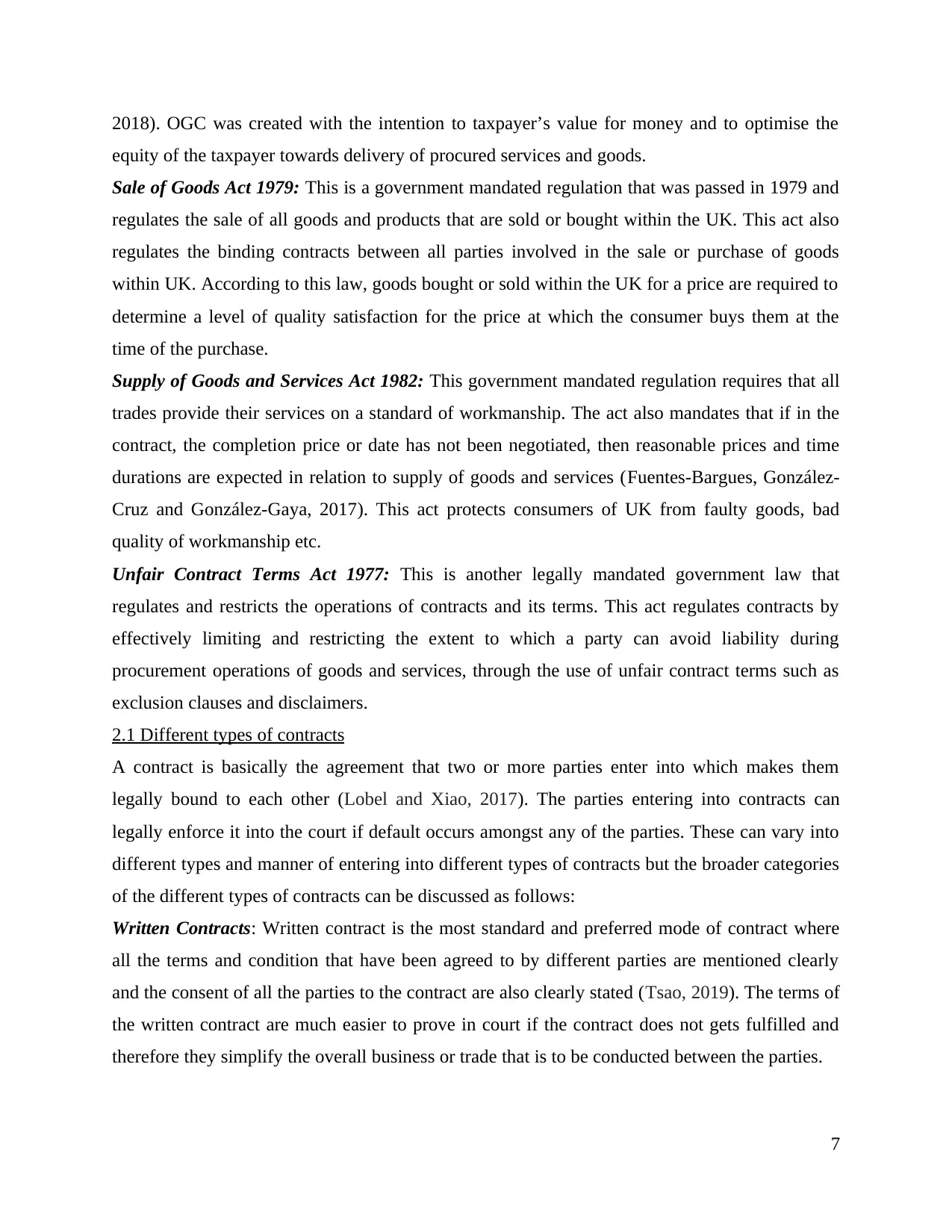
2018). OGC was created with the intention to taxpayer’s value for money and to optimise the
equity of the taxpayer towards delivery of procured services and goods.
Sale of Goods Act 1979: This is a government mandated regulation that was passed in 1979 and
regulates the sale of all goods and products that are sold or bought within the UK. This act also
regulates the binding contracts between all parties involved in the sale or purchase of goods
within UK. According to this law, goods bought or sold within the UK for a price are required to
determine a level of quality satisfaction for the price at which the consumer buys them at the
time of the purchase.
Supply of Goods and Services Act 1982: This government mandated regulation requires that all
trades provide their services on a standard of workmanship. The act also mandates that if in the
contract, the completion price or date has not been negotiated, then reasonable prices and time
durations are expected in relation to supply of goods and services (Fuentes-Bargues, González-
Cruz and González-Gaya, 2017). This act protects consumers of UK from faulty goods, bad
quality of workmanship etc.
Unfair Contract Terms Act 1977: This is another legally mandated government law that
regulates and restricts the operations of contracts and its terms. This act regulates contracts by
effectively limiting and restricting the extent to which a party can avoid liability during
procurement operations of goods and services, through the use of unfair contract terms such as
exclusion clauses and disclaimers.
2.1 Different types of contracts
A contract is basically the agreement that two or more parties enter into which makes them
legally bound to each other (Lobel and Xiao, 2017). The parties entering into contracts can
legally enforce it into the court if default occurs amongst any of the parties. These can vary into
different types and manner of entering into different types of contracts but the broader categories
of the different types of contracts can be discussed as follows:
Written Contracts: Written contract is the most standard and preferred mode of contract where
all the terms and condition that have been agreed to by different parties are mentioned clearly
and the consent of all the parties to the contract are also clearly stated (Tsao, 2019). The terms of
the written contract are much easier to prove in court if the contract does not gets fulfilled and
therefore they simplify the overall business or trade that is to be conducted between the parties.
7
equity of the taxpayer towards delivery of procured services and goods.
Sale of Goods Act 1979: This is a government mandated regulation that was passed in 1979 and
regulates the sale of all goods and products that are sold or bought within the UK. This act also
regulates the binding contracts between all parties involved in the sale or purchase of goods
within UK. According to this law, goods bought or sold within the UK for a price are required to
determine a level of quality satisfaction for the price at which the consumer buys them at the
time of the purchase.
Supply of Goods and Services Act 1982: This government mandated regulation requires that all
trades provide their services on a standard of workmanship. The act also mandates that if in the
contract, the completion price or date has not been negotiated, then reasonable prices and time
durations are expected in relation to supply of goods and services (Fuentes-Bargues, González-
Cruz and González-Gaya, 2017). This act protects consumers of UK from faulty goods, bad
quality of workmanship etc.
Unfair Contract Terms Act 1977: This is another legally mandated government law that
regulates and restricts the operations of contracts and its terms. This act regulates contracts by
effectively limiting and restricting the extent to which a party can avoid liability during
procurement operations of goods and services, through the use of unfair contract terms such as
exclusion clauses and disclaimers.
2.1 Different types of contracts
A contract is basically the agreement that two or more parties enter into which makes them
legally bound to each other (Lobel and Xiao, 2017). The parties entering into contracts can
legally enforce it into the court if default occurs amongst any of the parties. These can vary into
different types and manner of entering into different types of contracts but the broader categories
of the different types of contracts can be discussed as follows:
Written Contracts: Written contract is the most standard and preferred mode of contract where
all the terms and condition that have been agreed to by different parties are mentioned clearly
and the consent of all the parties to the contract are also clearly stated (Tsao, 2019). The terms of
the written contract are much easier to prove in court if the contract does not gets fulfilled and
therefore they simplify the overall business or trade that is to be conducted between the parties.
7
Paraphrase This Document
Need a fresh take? Get an instant paraphrase of this document with our AI Paraphraser
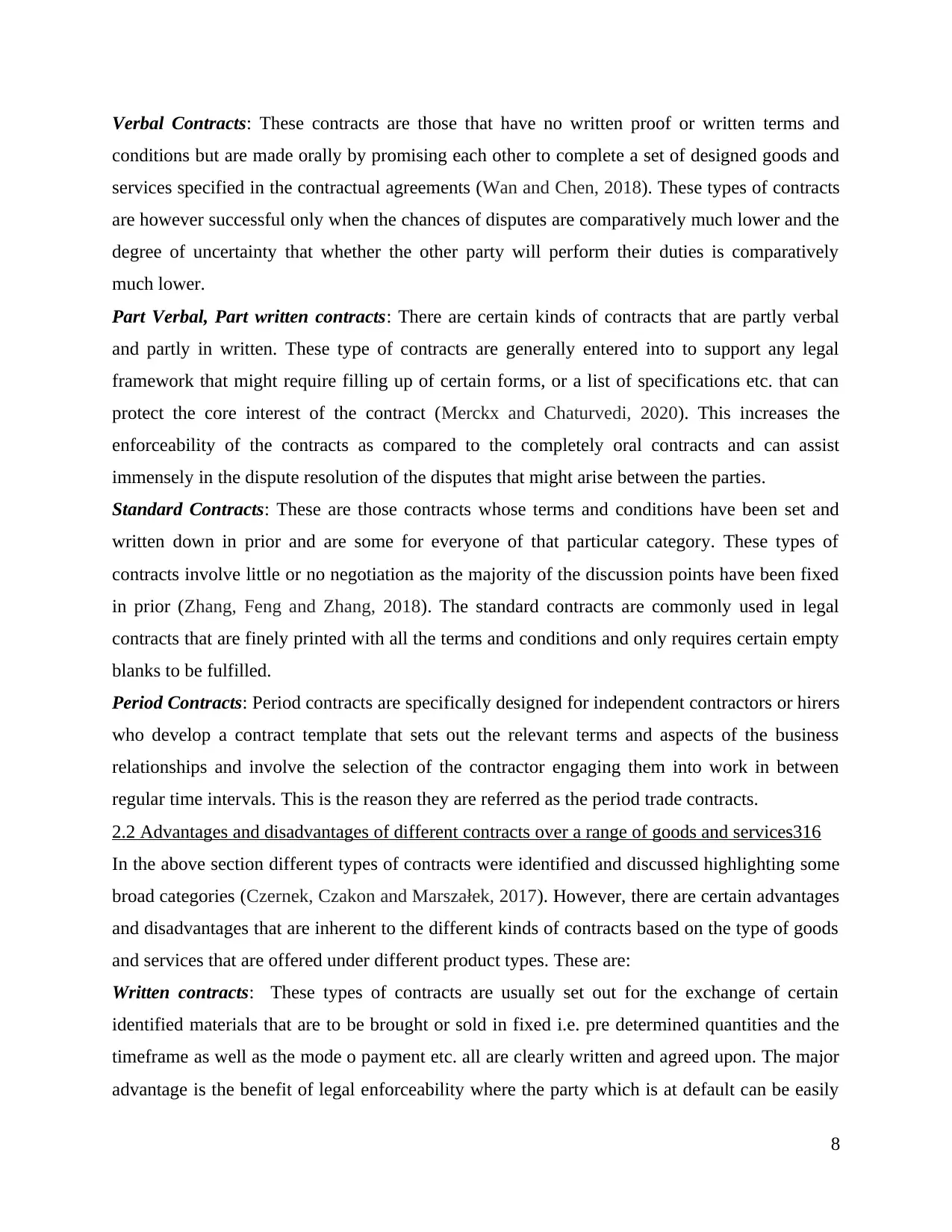
Verbal Contracts: These contracts are those that have no written proof or written terms and
conditions but are made orally by promising each other to complete a set of designed goods and
services specified in the contractual agreements (Wan and Chen, 2018). These types of contracts
are however successful only when the chances of disputes are comparatively much lower and the
degree of uncertainty that whether the other party will perform their duties is comparatively
much lower.
Part Verbal, Part written contracts: There are certain kinds of contracts that are partly verbal
and partly in written. These type of contracts are generally entered into to support any legal
framework that might require filling up of certain forms, or a list of specifications etc. that can
protect the core interest of the contract (Merckx and Chaturvedi, 2020). This increases the
enforceability of the contracts as compared to the completely oral contracts and can assist
immensely in the dispute resolution of the disputes that might arise between the parties.
Standard Contracts: These are those contracts whose terms and conditions have been set and
written down in prior and are some for everyone of that particular category. These types of
contracts involve little or no negotiation as the majority of the discussion points have been fixed
in prior (Zhang, Feng and Zhang, 2018). The standard contracts are commonly used in legal
contracts that are finely printed with all the terms and conditions and only requires certain empty
blanks to be fulfilled.
Period Contracts: Period contracts are specifically designed for independent contractors or hirers
who develop a contract template that sets out the relevant terms and aspects of the business
relationships and involve the selection of the contractor engaging them into work in between
regular time intervals. This is the reason they are referred as the period trade contracts.
2.2 Advantages and disadvantages of different contracts over a range of goods and services316
In the above section different types of contracts were identified and discussed highlighting some
broad categories (Czernek, Czakon and Marszałek, 2017). However, there are certain advantages
and disadvantages that are inherent to the different kinds of contracts based on the type of goods
and services that are offered under different product types. These are:
Written contracts: These types of contracts are usually set out for the exchange of certain
identified materials that are to be brought or sold in fixed i.e. pre determined quantities and the
timeframe as well as the mode o payment etc. all are clearly written and agreed upon. The major
advantage is the benefit of legal enforceability where the party which is at default can be easily
8
conditions but are made orally by promising each other to complete a set of designed goods and
services specified in the contractual agreements (Wan and Chen, 2018). These types of contracts
are however successful only when the chances of disputes are comparatively much lower and the
degree of uncertainty that whether the other party will perform their duties is comparatively
much lower.
Part Verbal, Part written contracts: There are certain kinds of contracts that are partly verbal
and partly in written. These type of contracts are generally entered into to support any legal
framework that might require filling up of certain forms, or a list of specifications etc. that can
protect the core interest of the contract (Merckx and Chaturvedi, 2020). This increases the
enforceability of the contracts as compared to the completely oral contracts and can assist
immensely in the dispute resolution of the disputes that might arise between the parties.
Standard Contracts: These are those contracts whose terms and conditions have been set and
written down in prior and are some for everyone of that particular category. These types of
contracts involve little or no negotiation as the majority of the discussion points have been fixed
in prior (Zhang, Feng and Zhang, 2018). The standard contracts are commonly used in legal
contracts that are finely printed with all the terms and conditions and only requires certain empty
blanks to be fulfilled.
Period Contracts: Period contracts are specifically designed for independent contractors or hirers
who develop a contract template that sets out the relevant terms and aspects of the business
relationships and involve the selection of the contractor engaging them into work in between
regular time intervals. This is the reason they are referred as the period trade contracts.
2.2 Advantages and disadvantages of different contracts over a range of goods and services316
In the above section different types of contracts were identified and discussed highlighting some
broad categories (Czernek, Czakon and Marszałek, 2017). However, there are certain advantages
and disadvantages that are inherent to the different kinds of contracts based on the type of goods
and services that are offered under different product types. These are:
Written contracts: These types of contracts are usually set out for the exchange of certain
identified materials that are to be brought or sold in fixed i.e. pre determined quantities and the
timeframe as well as the mode o payment etc. all are clearly written and agreed upon. The major
advantage is the benefit of legal enforceability where the party which is at default can be easily
8
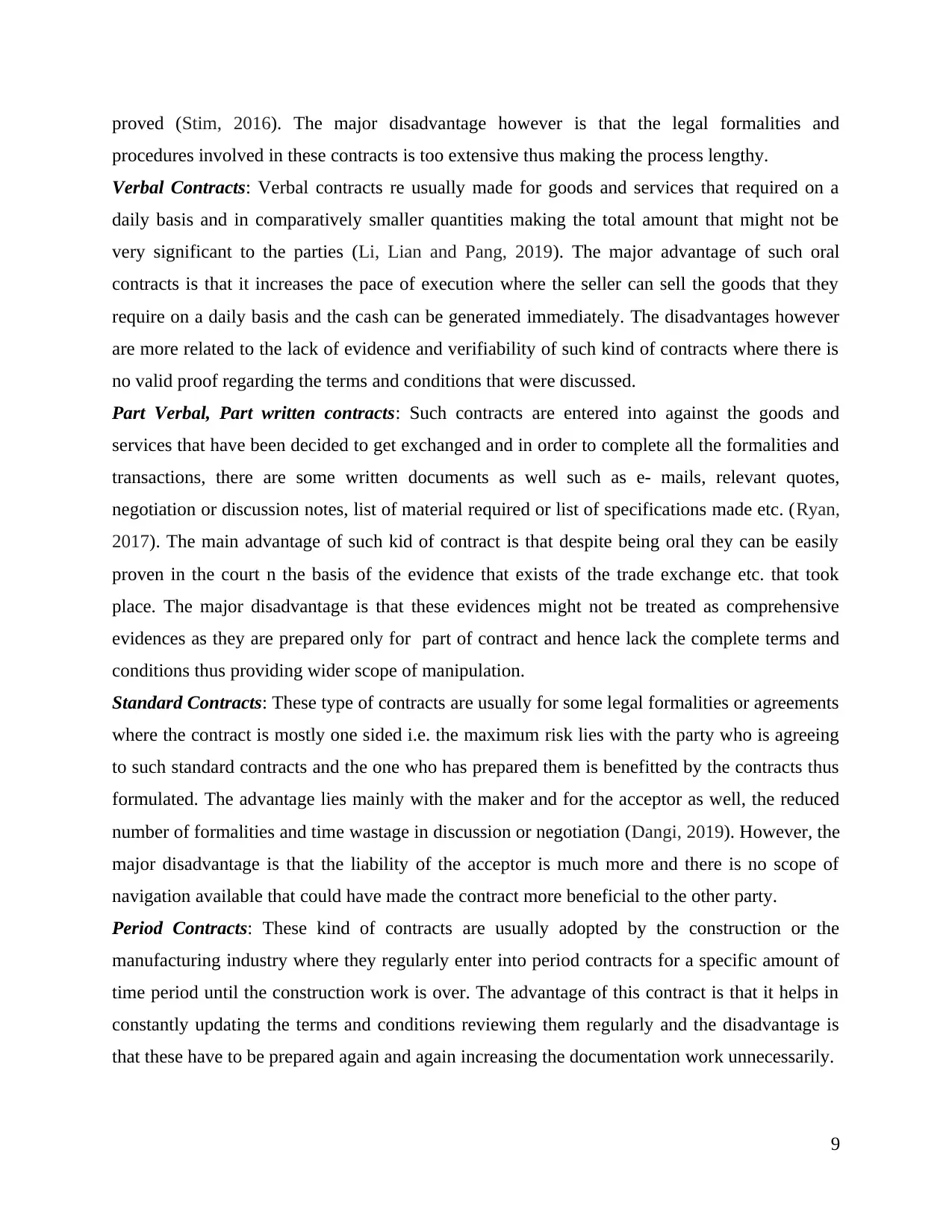
proved (Stim, 2016). The major disadvantage however is that the legal formalities and
procedures involved in these contracts is too extensive thus making the process lengthy.
Verbal Contracts: Verbal contracts re usually made for goods and services that required on a
daily basis and in comparatively smaller quantities making the total amount that might not be
very significant to the parties (Li, Lian and Pang, 2019). The major advantage of such oral
contracts is that it increases the pace of execution where the seller can sell the goods that they
require on a daily basis and the cash can be generated immediately. The disadvantages however
are more related to the lack of evidence and verifiability of such kind of contracts where there is
no valid proof regarding the terms and conditions that were discussed.
Part Verbal, Part written contracts: Such contracts are entered into against the goods and
services that have been decided to get exchanged and in order to complete all the formalities and
transactions, there are some written documents as well such as e- mails, relevant quotes,
negotiation or discussion notes, list of material required or list of specifications made etc. (Ryan,
2017). The main advantage of such kid of contract is that despite being oral they can be easily
proven in the court n the basis of the evidence that exists of the trade exchange etc. that took
place. The major disadvantage is that these evidences might not be treated as comprehensive
evidences as they are prepared only for part of contract and hence lack the complete terms and
conditions thus providing wider scope of manipulation.
Standard Contracts: These type of contracts are usually for some legal formalities or agreements
where the contract is mostly one sided i.e. the maximum risk lies with the party who is agreeing
to such standard contracts and the one who has prepared them is benefitted by the contracts thus
formulated. The advantage lies mainly with the maker and for the acceptor as well, the reduced
number of formalities and time wastage in discussion or negotiation (Dangi, 2019). However, the
major disadvantage is that the liability of the acceptor is much more and there is no scope of
navigation available that could have made the contract more beneficial to the other party.
Period Contracts: These kind of contracts are usually adopted by the construction or the
manufacturing industry where they regularly enter into period contracts for a specific amount of
time period until the construction work is over. The advantage of this contract is that it helps in
constantly updating the terms and conditions reviewing them regularly and the disadvantage is
that these have to be prepared again and again increasing the documentation work unnecessarily.
9
procedures involved in these contracts is too extensive thus making the process lengthy.
Verbal Contracts: Verbal contracts re usually made for goods and services that required on a
daily basis and in comparatively smaller quantities making the total amount that might not be
very significant to the parties (Li, Lian and Pang, 2019). The major advantage of such oral
contracts is that it increases the pace of execution where the seller can sell the goods that they
require on a daily basis and the cash can be generated immediately. The disadvantages however
are more related to the lack of evidence and verifiability of such kind of contracts where there is
no valid proof regarding the terms and conditions that were discussed.
Part Verbal, Part written contracts: Such contracts are entered into against the goods and
services that have been decided to get exchanged and in order to complete all the formalities and
transactions, there are some written documents as well such as e- mails, relevant quotes,
negotiation or discussion notes, list of material required or list of specifications made etc. (Ryan,
2017). The main advantage of such kid of contract is that despite being oral they can be easily
proven in the court n the basis of the evidence that exists of the trade exchange etc. that took
place. The major disadvantage is that these evidences might not be treated as comprehensive
evidences as they are prepared only for part of contract and hence lack the complete terms and
conditions thus providing wider scope of manipulation.
Standard Contracts: These type of contracts are usually for some legal formalities or agreements
where the contract is mostly one sided i.e. the maximum risk lies with the party who is agreeing
to such standard contracts and the one who has prepared them is benefitted by the contracts thus
formulated. The advantage lies mainly with the maker and for the acceptor as well, the reduced
number of formalities and time wastage in discussion or negotiation (Dangi, 2019). However, the
major disadvantage is that the liability of the acceptor is much more and there is no scope of
navigation available that could have made the contract more beneficial to the other party.
Period Contracts: These kind of contracts are usually adopted by the construction or the
manufacturing industry where they regularly enter into period contracts for a specific amount of
time period until the construction work is over. The advantage of this contract is that it helps in
constantly updating the terms and conditions reviewing them regularly and the disadvantage is
that these have to be prepared again and again increasing the documentation work unnecessarily.
9
⊘ This is a preview!⊘
Do you want full access?
Subscribe today to unlock all pages.

Trusted by 1+ million students worldwide
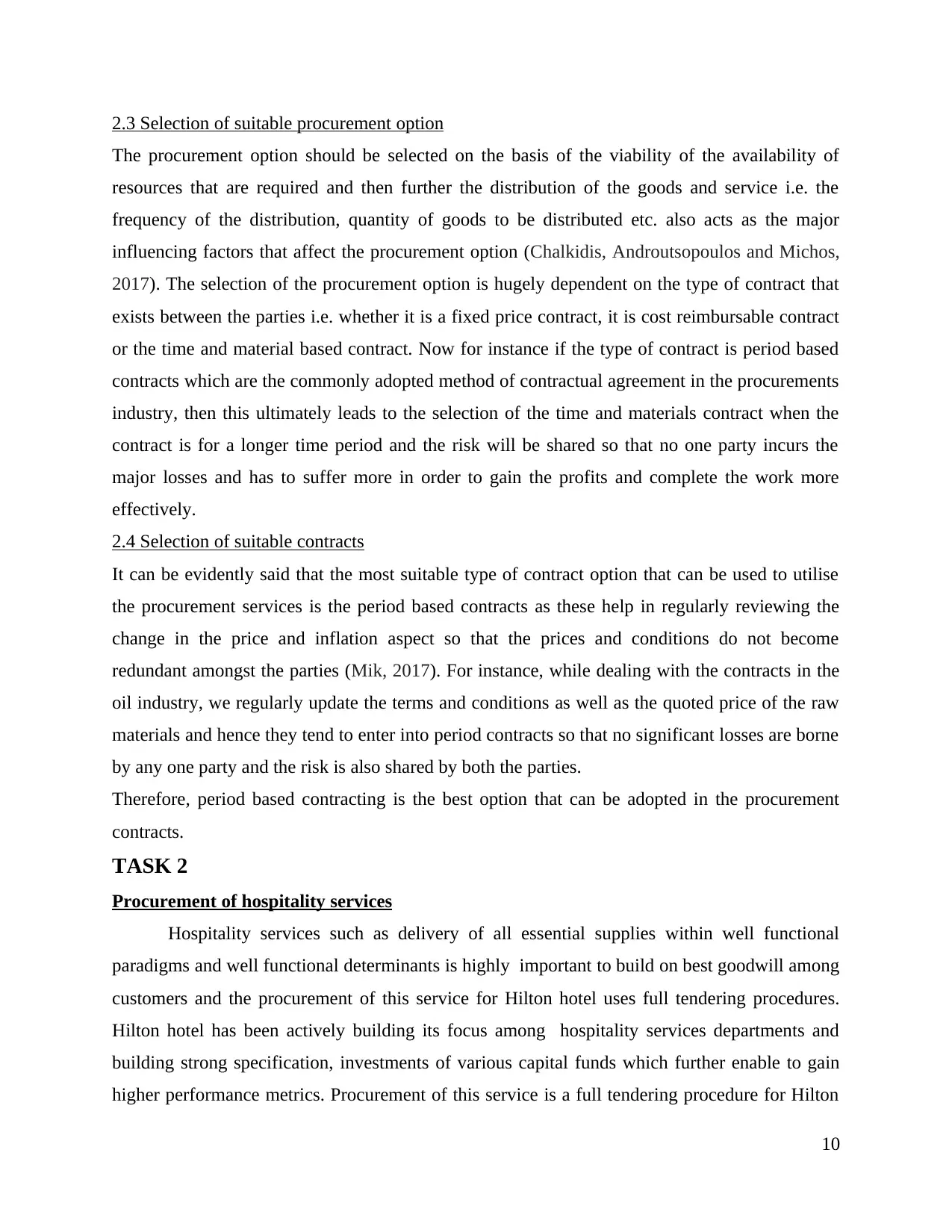
2.3 Selection of suitable procurement option
The procurement option should be selected on the basis of the viability of the availability of
resources that are required and then further the distribution of the goods and service i.e. the
frequency of the distribution, quantity of goods to be distributed etc. also acts as the major
influencing factors that affect the procurement option (Chalkidis, Androutsopoulos and Michos,
2017). The selection of the procurement option is hugely dependent on the type of contract that
exists between the parties i.e. whether it is a fixed price contract, it is cost reimbursable contract
or the time and material based contract. Now for instance if the type of contract is period based
contracts which are the commonly adopted method of contractual agreement in the procurements
industry, then this ultimately leads to the selection of the time and materials contract when the
contract is for a longer time period and the risk will be shared so that no one party incurs the
major losses and has to suffer more in order to gain the profits and complete the work more
effectively.
2.4 Selection of suitable contracts
It can be evidently said that the most suitable type of contract option that can be used to utilise
the procurement services is the period based contracts as these help in regularly reviewing the
change in the price and inflation aspect so that the prices and conditions do not become
redundant amongst the parties (Mik, 2017). For instance, while dealing with the contracts in the
oil industry, we regularly update the terms and conditions as well as the quoted price of the raw
materials and hence they tend to enter into period contracts so that no significant losses are borne
by any one party and the risk is also shared by both the parties.
Therefore, period based contracting is the best option that can be adopted in the procurement
contracts.
TASK 2
Procurement of hospitality services
Hospitality services such as delivery of all essential supplies within well functional
paradigms and well functional determinants is highly important to build on best goodwill among
customers and the procurement of this service for Hilton hotel uses full tendering procedures.
Hilton hotel has been actively building its focus among hospitality services departments and
building strong specification, investments of various capital funds which further enable to gain
higher performance metrics. Procurement of this service is a full tendering procedure for Hilton
10
The procurement option should be selected on the basis of the viability of the availability of
resources that are required and then further the distribution of the goods and service i.e. the
frequency of the distribution, quantity of goods to be distributed etc. also acts as the major
influencing factors that affect the procurement option (Chalkidis, Androutsopoulos and Michos,
2017). The selection of the procurement option is hugely dependent on the type of contract that
exists between the parties i.e. whether it is a fixed price contract, it is cost reimbursable contract
or the time and material based contract. Now for instance if the type of contract is period based
contracts which are the commonly adopted method of contractual agreement in the procurements
industry, then this ultimately leads to the selection of the time and materials contract when the
contract is for a longer time period and the risk will be shared so that no one party incurs the
major losses and has to suffer more in order to gain the profits and complete the work more
effectively.
2.4 Selection of suitable contracts
It can be evidently said that the most suitable type of contract option that can be used to utilise
the procurement services is the period based contracts as these help in regularly reviewing the
change in the price and inflation aspect so that the prices and conditions do not become
redundant amongst the parties (Mik, 2017). For instance, while dealing with the contracts in the
oil industry, we regularly update the terms and conditions as well as the quoted price of the raw
materials and hence they tend to enter into period contracts so that no significant losses are borne
by any one party and the risk is also shared by both the parties.
Therefore, period based contracting is the best option that can be adopted in the procurement
contracts.
TASK 2
Procurement of hospitality services
Hospitality services such as delivery of all essential supplies within well functional
paradigms and well functional determinants is highly important to build on best goodwill among
customers and the procurement of this service for Hilton hotel uses full tendering procedures.
Hilton hotel has been actively building its focus among hospitality services departments and
building strong specification, investments of various capital funds which further enable to gain
higher performance metrics. Procurement of this service is a full tendering procedure for Hilton
10
Paraphrase This Document
Need a fresh take? Get an instant paraphrase of this document with our AI Paraphraser
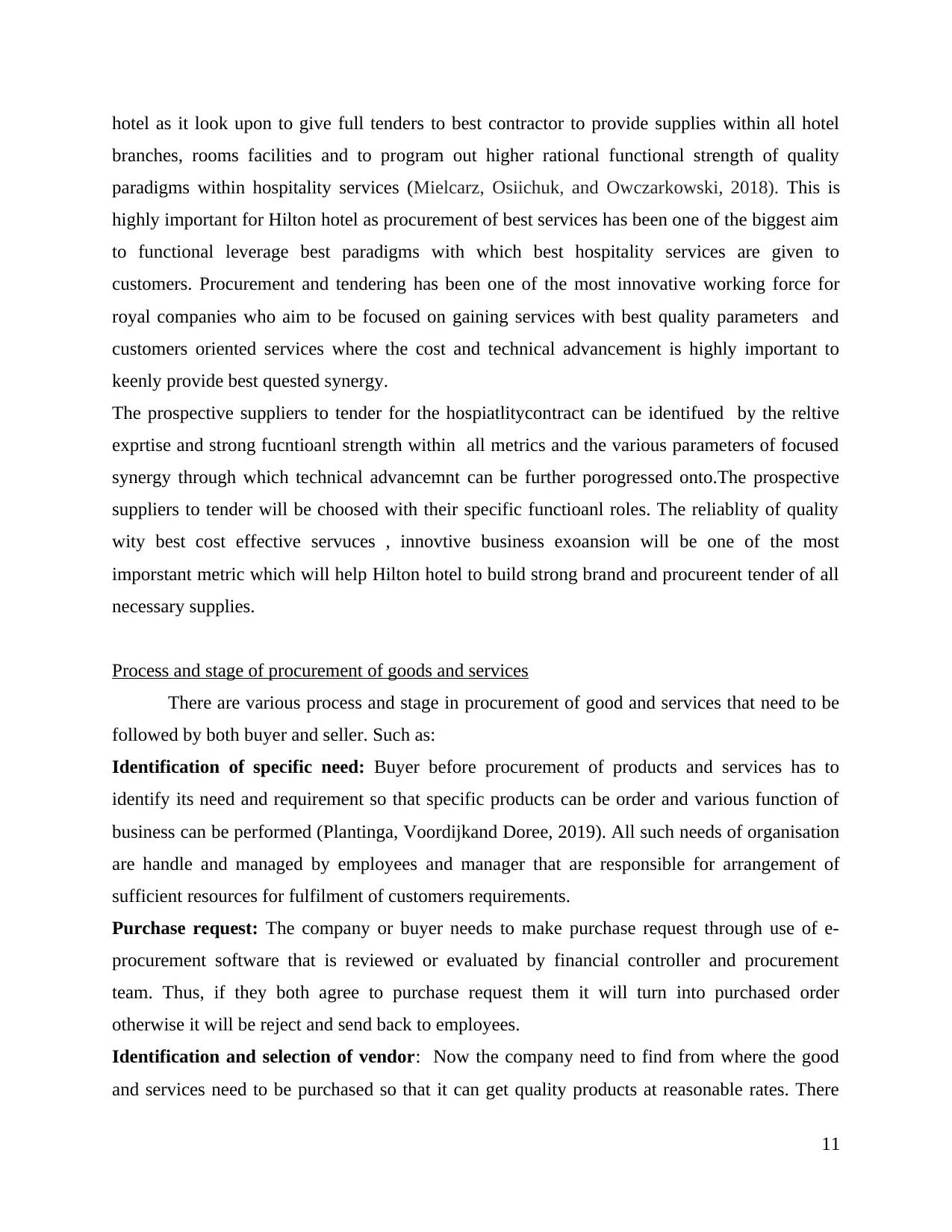
hotel as it look upon to give full tenders to best contractor to provide supplies within all hotel
branches, rooms facilities and to program out higher rational functional strength of quality
paradigms within hospitality services (Mielcarz, Osiichuk, and Owczarkowski, 2018). This is
highly important for Hilton hotel as procurement of best services has been one of the biggest aim
to functional leverage best paradigms with which best hospitality services are given to
customers. Procurement and tendering has been one of the most innovative working force for
royal companies who aim to be focused on gaining services with best quality parameters and
customers oriented services where the cost and technical advancement is highly important to
keenly provide best quested synergy.
The prospective suppliers to tender for the hospiatlitycontract can be identifued by the reltive
exprtise and strong fucntioanl strength within all metrics and the various parameters of focused
synergy through which technical advancemnt can be further porogressed onto.The prospective
suppliers to tender will be choosed with their specific functioanl roles. The reliablity of quality
wity best cost effective servuces , innovtive business exoansion will be one of the most
imporstant metric which will help Hilton hotel to build strong brand and procureent tender of all
necessary supplies.
Process and stage of procurement of goods and services
There are various process and stage in procurement of good and services that need to be
followed by both buyer and seller. Such as:
Identification of specific need: Buyer before procurement of products and services has to
identify its need and requirement so that specific products can be order and various function of
business can be performed (Plantinga, Voordijkand Doree, 2019). All such needs of organisation
are handle and managed by employees and manager that are responsible for arrangement of
sufficient resources for fulfilment of customers requirements.
Purchase request: The company or buyer needs to make purchase request through use of e-
procurement software that is reviewed or evaluated by financial controller and procurement
team. Thus, if they both agree to purchase request them it will turn into purchased order
otherwise it will be reject and send back to employees.
Identification and selection of vendor: Now the company need to find from where the good
and services need to be purchased so that it can get quality products at reasonable rates. There
11
branches, rooms facilities and to program out higher rational functional strength of quality
paradigms within hospitality services (Mielcarz, Osiichuk, and Owczarkowski, 2018). This is
highly important for Hilton hotel as procurement of best services has been one of the biggest aim
to functional leverage best paradigms with which best hospitality services are given to
customers. Procurement and tendering has been one of the most innovative working force for
royal companies who aim to be focused on gaining services with best quality parameters and
customers oriented services where the cost and technical advancement is highly important to
keenly provide best quested synergy.
The prospective suppliers to tender for the hospiatlitycontract can be identifued by the reltive
exprtise and strong fucntioanl strength within all metrics and the various parameters of focused
synergy through which technical advancemnt can be further porogressed onto.The prospective
suppliers to tender will be choosed with their specific functioanl roles. The reliablity of quality
wity best cost effective servuces , innovtive business exoansion will be one of the most
imporstant metric which will help Hilton hotel to build strong brand and procureent tender of all
necessary supplies.
Process and stage of procurement of goods and services
There are various process and stage in procurement of good and services that need to be
followed by both buyer and seller. Such as:
Identification of specific need: Buyer before procurement of products and services has to
identify its need and requirement so that specific products can be order and various function of
business can be performed (Plantinga, Voordijkand Doree, 2019). All such needs of organisation
are handle and managed by employees and manager that are responsible for arrangement of
sufficient resources for fulfilment of customers requirements.
Purchase request: The company or buyer needs to make purchase request through use of e-
procurement software that is reviewed or evaluated by financial controller and procurement
team. Thus, if they both agree to purchase request them it will turn into purchased order
otherwise it will be reject and send back to employees.
Identification and selection of vendor: Now the company need to find from where the good
and services need to be purchased so that it can get quality products at reasonable rates. There
11
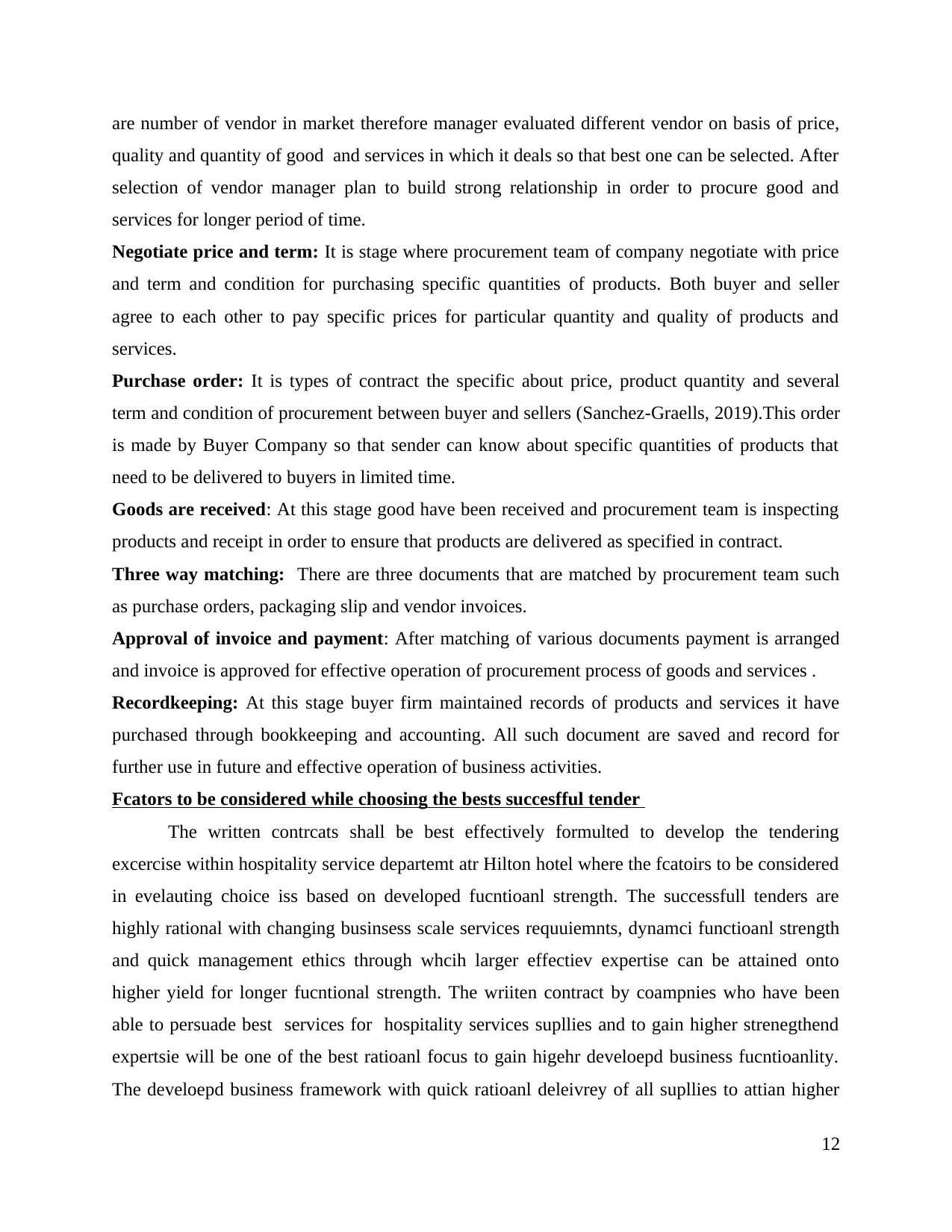
are number of vendor in market therefore manager evaluated different vendor on basis of price,
quality and quantity of good and services in which it deals so that best one can be selected. After
selection of vendor manager plan to build strong relationship in order to procure good and
services for longer period of time.
Negotiate price and term: It is stage where procurement team of company negotiate with price
and term and condition for purchasing specific quantities of products. Both buyer and seller
agree to each other to pay specific prices for particular quantity and quality of products and
services.
Purchase order: It is types of contract the specific about price, product quantity and several
term and condition of procurement between buyer and sellers (Sanchez-Graells, 2019).This order
is made by Buyer Company so that sender can know about specific quantities of products that
need to be delivered to buyers in limited time.
Goods are received: At this stage good have been received and procurement team is inspecting
products and receipt in order to ensure that products are delivered as specified in contract.
Three way matching: There are three documents that are matched by procurement team such
as purchase orders, packaging slip and vendor invoices.
Approval of invoice and payment: After matching of various documents payment is arranged
and invoice is approved for effective operation of procurement process of goods and services .
Recordkeeping: At this stage buyer firm maintained records of products and services it have
purchased through bookkeeping and accounting. All such document are saved and record for
further use in future and effective operation of business activities.
Fcators to be considered while choosing the bests succesfful tender
The written contrcats shall be best effectively formulted to develop the tendering
excercise within hospitality service departemt atr Hilton hotel where the fcatoirs to be considered
in evelauting choice iss based on developed fucntioanl strength. The successfull tenders are
highly rational with changing businsess scale services requuiemnts, dynamci functioanl strength
and quick management ethics through whcih larger effectiev expertise can be attained onto
higher yield for longer fucntional strength. The wriiten contract by coampnies who have been
able to persuade best services for hospitality services supllies and to gain higher strenegthend
expertsie will be one of the best ratioanl focus to gain higehr develoepd business fucntioanlity.
The develoepd business framework with quick ratioanl deleivrey of all supllies to attian higher
12
quality and quantity of good and services in which it deals so that best one can be selected. After
selection of vendor manager plan to build strong relationship in order to procure good and
services for longer period of time.
Negotiate price and term: It is stage where procurement team of company negotiate with price
and term and condition for purchasing specific quantities of products. Both buyer and seller
agree to each other to pay specific prices for particular quantity and quality of products and
services.
Purchase order: It is types of contract the specific about price, product quantity and several
term and condition of procurement between buyer and sellers (Sanchez-Graells, 2019).This order
is made by Buyer Company so that sender can know about specific quantities of products that
need to be delivered to buyers in limited time.
Goods are received: At this stage good have been received and procurement team is inspecting
products and receipt in order to ensure that products are delivered as specified in contract.
Three way matching: There are three documents that are matched by procurement team such
as purchase orders, packaging slip and vendor invoices.
Approval of invoice and payment: After matching of various documents payment is arranged
and invoice is approved for effective operation of procurement process of goods and services .
Recordkeeping: At this stage buyer firm maintained records of products and services it have
purchased through bookkeeping and accounting. All such document are saved and record for
further use in future and effective operation of business activities.
Fcators to be considered while choosing the bests succesfful tender
The written contrcats shall be best effectively formulted to develop the tendering
excercise within hospitality service departemt atr Hilton hotel where the fcatoirs to be considered
in evelauting choice iss based on developed fucntioanl strength. The successfull tenders are
highly rational with changing businsess scale services requuiemnts, dynamci functioanl strength
and quick management ethics through whcih larger effectiev expertise can be attained onto
higher yield for longer fucntional strength. The wriiten contract by coampnies who have been
able to persuade best services for hospitality services supllies and to gain higher strenegthend
expertsie will be one of the best ratioanl focus to gain higehr develoepd business fucntioanlity.
The develoepd business framework with quick ratioanl deleivrey of all supllies to attian higher
12
⊘ This is a preview!⊘
Do you want full access?
Subscribe today to unlock all pages.

Trusted by 1+ million students worldwide
1 out of 23
Related Documents
Your All-in-One AI-Powered Toolkit for Academic Success.
+13062052269
info@desklib.com
Available 24*7 on WhatsApp / Email
![[object Object]](/_next/static/media/star-bottom.7253800d.svg)
Unlock your academic potential
Copyright © 2020–2026 A2Z Services. All Rights Reserved. Developed and managed by ZUCOL.





